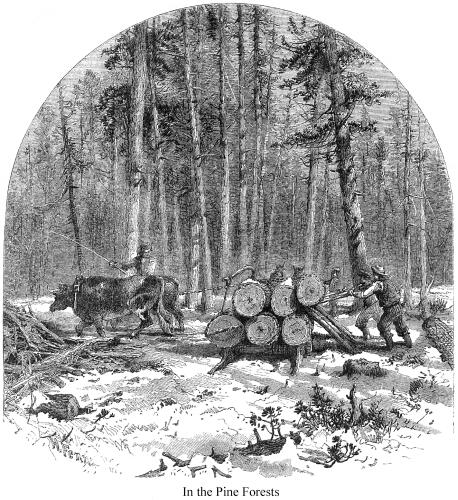 The Minnesota Pineries The Minnesota Pineries
Harper's New Monthly Magazine
—March, 1868
WHEN a Minneapolis or St. Anthony lumberman contemplates a
business visit to the pine regions of Northern Minnesota he expresses
his intention by saying that he is "going up river."
The appropriateness of such language is apparent enough when we
learn that the portions of country referred to lie on the Upper
Mississippi and its tributaries. One of the most important of
these tributaries, especially in connection with the pineries
of which we speak, is Rum River; and thus, when one of the lords
of the Minneapolis lumber-mills invited me, in the early part
of March, 1867, to go with him "up river," I knew at
once that it signified a journey to the lumber-camps on one of
the above streams, a hundred miles or more from home, and well
into those forests which stretch their unbroken solitudes far
toward the shores of Hudson's Bay. I was more than willing to
accept the invitation, for I had long cherished a desire to see
those famous forests, to go over the old Indian hunting-grounds,
and, not the least of all, to snuff the pure native odor of freshly-cut
pine logs.
This time "up river" meant up Rum River, a stream
which joins the Mississippi on the east, at Anoka, eighteen miles
above St. Anthony Falls. How or when it received its anti-temperance
name is not known, at least to the writer, but, like most of certain
beverages common nowadays, it contains more water than rum—and
the more water the better in both cases. It is a singular coincidence
that either the river itself or one of its principal branches
has its source in Sugar Lake.
Although the place of our destination lay near the sources
of Rum River, we found it more convenient to go by rail some twelve
miles above the junction of this river with the Mississippi to
Elk River, and thence across by a shorter route. Our friend had
taken the precaution to send up on the previous day his own sleigh
and horses, which were nearly ready for us as we alighted, about
twelve o'clock, from the cars. Taking a hurried dinner at the
very unpretentious Elk River Hotel, we prepared for a trip of
twenty miles or more over the prairie, and in an atmosphere that
was driving the mercury below zero. We toasted the bottoms of
our boots, strapped on our cloth overshoes, slipped into our beaver
coats (my friend added a wolf-robe), wrapped our shoulders with
shawls, pulled our caps down over our ears, then, jumping into
the sleigh, and covering our limbs with a well-lined buffalo-skin,
started off; feeling as though we could safely defy the blasts
of Spitzbergen. George and Kate, our noble steeds, dashed on at
a splendid rate. The latter animal was once a rebel, or probably
was, as she was owned by one. She was captured by a distinguished
Federal officer, near the close of the late war, and brought North;
instead of returning to champ the Southern bit again she remained
to obey the reconstructive reins of her Minneapolis owner, who
provides her with plenty of loyal hay and oats, and who is as
proud of her as though she had her birth in sight of Bunker Hill.
She trotted so handsomely and seemed such a willing beast that
I soon forgot her Confederate tricks, and would gladly have recommended
her for unconditional pardon. The former animal was not as young
and smooth-limbed as his chestnut-colored companion, but he strove
hard to keep an even whiffletree. Both appeared to feel an extra
exhilaration from the frosty air, for they shot along the beaten
snow-path with such astonishing swiftness that our movement might
almost have been compared to a railroad train, the smoke of my
f'riend's cigar, ascending in glorious white clouds, making the
figure more complete. We rode over a wild, undulating tract of
country, broken by a few scattering oaks, and here and there a
bold knoll or narrow ridge, but showing few houses. We saw not
more than three or four dwellings in a distance of fifteen miles.
Our horses stopped, after two or three hours of smart trotting,
before a small frame building, which, by a rude sign that hung
from a still ruder pole, surmounted by a martin-box, we learned
was the American House. The few houses scattered about constituted
the village of Princeton, an unpretending, honest-looking place,
and buttoned on to the dark skirts of the big woods. A man appeared
at the door of the hotel in his shirt-sleeves, and with his gray
head uncovered, whom my friend addressed as "Brother Golden,"
and invited us in. We complied readily, for I, at least, was a
good deal chilled. The prairie blast, which the hyperborean fiends
had that afternoon whetted to an uncommon sharpness, pierced even
my extra garments, making me sigh for some hospitable fire. "Brother
Golden" appreciated our want. With true landlordly cheer
he filled the long, high stove, which stood knee-deep in a box
of sand, with dry wood, and, as the flames roared their welcome
to the shivering travelers from "down river," he made
many inquiries, the last of which was, "Have you brought
me a paper?" My friend, remembering our good-natured landlord's
fondness for the latest news, and also that Uncle Sam can hardly
afford to send a mail-coach so near the big woods every day, had
filled his pockets with St. Paul and Minneapolis dailies, which
the old man accepted, and commenced devouring with a singular
relish.
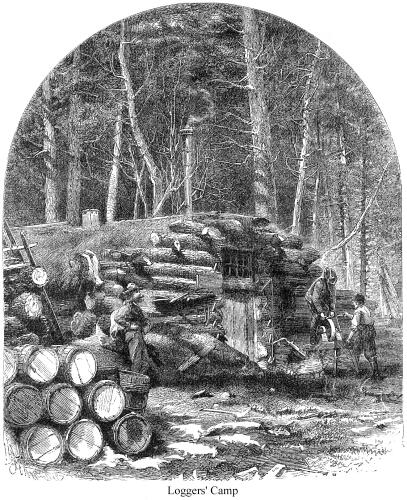 As soon as the frost was thoroughly
melted out of us we donned our outer garments again and started
on. Leaving the village, we immediately crossed the "West
Branch" (of Rum River), and then struck into the woods, my
friend remarking that we should see no more signs of civilization,
except in the lumber-camps, until our return. As soon as the frost was thoroughly
melted out of us we donned our outer garments again and started
on. Leaving the village, we immediately crossed the "West
Branch" (of Rum River), and then struck into the woods, my
friend remarking that we should see no more signs of civilization,
except in the lumber-camps, until our return.
Until a comparatively recent period the vast forest before
us had remained undisturbed, save by the savage tribes who were
here when Columbus discovered America, and who still linger around
the old trails, reluctant to give them over to the devouring march
of the white man. A few years ago several enterprising citizens
of Maine found out by some means that extensive tracts of pine
lands were hid away here, and thus, aided by the knowledge they
had gained in connection with the lumber business in their native
State, they hastened to purchase these lands, content to wait
until the increasing population of Iowa, Southern Minnesota, and
other portions of the Mississippi Valley should, by their almost
limitless demand for building material, demonstrate the wisdom
of such a business course. Saw-mills were soon erected on the
St. Croix, at St. Anthony Falls, Minneapolis, and other points;
the lumber trade increased from year to year, until at last it
has grown into an importance which few can realize who have not
made a personal inspection. In addition to the Minnesota pineries
we need not mention those of Michigan and Wisconsin. Beginning
at well-known points in the latter States, the pine regions stretch
along the Chippewa and St. Croix, the shores of Lake Superior,
and across to the Mississippi below and above St. Cloud. Altogether
they form perhaps the most extensive pine forests in North America.
They have already become the sources of fabulous wealth, and afford
a theatre for the lumber business excelling any thing ever witnessed
in Maine or New Brunswick. To say nothing of how far Chicago outstrips
Bangor as a lumber mart, it may be observed that the scenes once
witnessed on the banks of the Penobscot, Kennebec, Androscoggin,
Saco, and Passamaquoddy, and in the palmiest days of these rivers,
have been transferred to the Mississippi, Chippewa, St. Croix,
and Rum River. The saw-mills at Minneapolis and St. Anthony turn
out annually over one hundred millions of feet of boards, and
are pushing the figures higher and higher every year; and thus
the same process which has demolished the forests of Maine, which
has scared the elk, and moose, and. beaver, and their elder brother,
the Indian, away from their Eastern haunts, is already far advanced
in the West.
Impressed with all of the above facts—remembering how
brief a period had elapsed since silence held undisputed sway
in the unpeopled shades before us, since a journey here seemed
more impossible to accomplish than a trip to Kane's Open Sea does
now, since I put my ten-year-old finger down on the map at a point
called St. Anthony Falls and thought it far enough away to be
included in the dimmest regions of romance, and yet, that peoples
from the other side of the Atlantic had already found this spot,
yea, were coming in annual thousands and selecting homes hundreds
of miles still nearer the setting sun—that an army of sturdy
emigrants from beyond the Baltic Sea, from the foot of the Alps,
and from the land of Erin, were waiting here, with axes in hand,
to hew down all these forests—remembering all this, the feelings
which crept over me as we left the open prairie and plunged into
the dark thick wilderness were strange and startling enough. And
our imagination at this moment was rendered more intense because
the night was coming on, and because we were riding under the
first pinetrees we had seen, whose leafy tops, swept by a strong
northwest wind, struck up a doleful music. We fancied that the
continual jingle of Kate's girdle of bells, the frosty murmur
of the sleigh-runners, and the occasional striking of the outer
ends of the whiffletrees against some trunk or bush that crowded
too near the road, must awaken unwelcome echoes in the dusky depths
about us, and that the lingering ghost of some Dakota savage might
possibly start up and defy our further intrusion upon, his old
hunting-grounds.
After a couple of hours' ride we came to a fork in the road,
and, for the first time, my friend was in doubt which way to go.
He stopped his horses, and we held a council. We looked about
for a finger-board, but found none. One road we knew led to Tidd's
Camp—the camp we were in search of—and the other to
somebody's else camp. The full moon peered out from a rift in
the clouds, and sprinkled its beams down through the oaks, poplars,
and pines, but not a ray of light penetrated our doubts. The trees
seemed to say, with provoking indifference, as we looked up at
them inquiringly, "We know how to stand here and grow; we
know how and when to open our buds and shed our leaves, and which
way to fall when we get old and rotten, or when the woodmen cut
us down; but we do not know the way to Tidd's Camp." George
and Kate threw their ears backward and forward, looked up one
road, then up the other, and finally, turning their heads round
at us, apparently confessed that their horse sense was as much
puzzled as our human sense; that although they would obey the
reins and go either way; they would rather not take the responsibility
of offering advice. The manner, however, in which they champed
their bits and pawed the snow showed that they were getting impatient
for a decision. We, too, desired to have the matter settled, for
we began to ache with cold, and felt a pressing need of shelter.
Our horses, in the mean time, had moved about half their length
toward the right, and for this reason, as much as any, we concluded
to take that direction, and started on. We had gone only two or
three miles before we learned our mistake—that the right
road was the wrong road, or again, that the right
road was the left road. We turned about, went back
to the fork, took the left road, and in half an hour came to a
small circular opening, containing in its centre a clump of log-buildings,
which we at once pronounced to be Tidd's Camp. A column of smoke
with frequent sparks of fire pointed out the location of the lodgers'
building, and driving up before it, as we would have done before
a country hotel, my friend cried "Whoa!" in a tone which
he evidently intended the lodgers should hear as well as the horses.
Immediately a small door was partially opened, its wooden hinges
creaking with frost, when a man in a brown woolen shirt thrust
out his bushy head and exclaimed, "Hullo!" My friend
answered with a "Hullo!" This salutatory term, as used
by the first speaker, meant, when fully interpreted, "I am
one of the lodgers in Tidd's Camp; who are you?" As used
by the second speaker it meant, "I am one of the owners of
these pine forests, and have come up to see how my loggers are
getting on." The man in the door and the man in the sleigh
understood each other at once, and while the former put on his
hat and came out to take charge of the horses, the latter and
I went into the camp. Many of the sights which met my eyes on
entering were novel enough to one unacquainted with life in the
pineries. The thing I was most glad to see just then was the huge
fire in the centre of the camp, consuming a great pile of logs,
and sending its smoke through a large, square wooden chimney.
I stood before the hot, roaring flames, turned myself about, melting
first one side, then the other, and in the mean time took frequent
surveys of the apartment.
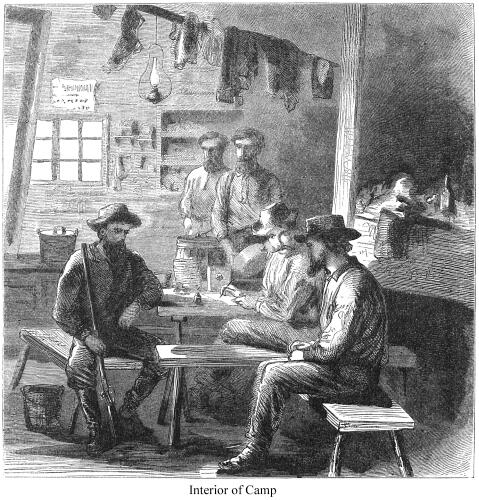 The camp was about thirty feet
long and twenty feet wide. Its ends and sides were constructed
of pine logs, notched at the ends, to enable them to lie closely,
and chinked with moss; the roof was made of pine splints, thatched
with mud, grass, etc. A small projection at the end opposite the
door, with a stove and pantry in it, was used as a cookroom. Across
the same end, next to the cook-room, but without any partition,
was a long space containing a rough table, hewed from a pine log,
set apart for the dining-room. The beds, or rather bed, for there
was no division in either the under or upper portion, was stretched
along on two sides of the fire, and so arranged that the sleepers'
heads nearly touched the opposite walls. I had heard the saying,
"thick as three in a bed," but here it was literally
as thick as a dozen in a bed. At the foot of the bed, between
the lodgers' feet and the fire, was a long, flat beam, called
the "Deacon's Seat." This Deacon's Seat is one of the
representative places in a lumberman's camp. It is a synonym for
a variety of scenes and memories. It is here that the logmen mount
themselves in the morning, after crawling from their bed of pine
boughs; here they sit and dress their feet, and from here they
drop off to their rest at night; here they arrange themselves
in a jolly row before the blazing fire, to make the long winter
evenings merry with their stories and jokes; here the visitor
at the camp is invited to sit and rest himself; here the men make
their bargains with the "boss," and receive their pay;
from this spot the logmen take their leave in the spring. And
thus the Deacon's Seat is associated with the whole interior life
of the camp, and is the magic word by which in after years one
logman reminds another of the events which transpired around the
log-fire in the distant pine woods. The camp was about thirty feet
long and twenty feet wide. Its ends and sides were constructed
of pine logs, notched at the ends, to enable them to lie closely,
and chinked with moss; the roof was made of pine splints, thatched
with mud, grass, etc. A small projection at the end opposite the
door, with a stove and pantry in it, was used as a cookroom. Across
the same end, next to the cook-room, but without any partition,
was a long space containing a rough table, hewed from a pine log,
set apart for the dining-room. The beds, or rather bed, for there
was no division in either the under or upper portion, was stretched
along on two sides of the fire, and so arranged that the sleepers'
heads nearly touched the opposite walls. I had heard the saying,
"thick as three in a bed," but here it was literally
as thick as a dozen in a bed. At the foot of the bed, between
the lodgers' feet and the fire, was a long, flat beam, called
the "Deacon's Seat." This Deacon's Seat is one of the
representative places in a lumberman's camp. It is a synonym for
a variety of scenes and memories. It is here that the logmen mount
themselves in the morning, after crawling from their bed of pine
boughs; here they sit and dress their feet, and from here they
drop off to their rest at night; here they arrange themselves
in a jolly row before the blazing fire, to make the long winter
evenings merry with their stories and jokes; here the visitor
at the camp is invited to sit and rest himself; here the men make
their bargains with the "boss," and receive their pay;
from this spot the logmen take their leave in the spring. And
thus the Deacon's Seat is associated with the whole interior life
of the camp, and is the magic word by which in after years one
logman reminds another of the events which transpired around the
log-fire in the distant pine woods.
The loggers had all retired except the cook and two or three
others; but none of them were asleep. Their long row of heads
under the low, slanting roof almost startled me, for each pair
of eyes, reflecting the flames that shot up from the middle of
the camp, glared at me like so many balls of fire. The men watched
my rotary motions before the burning logs as though they thought
I might be a piece of meat, and was trying to roast myself. They
lay on their sides, all facing one way, and packed as closely
as a bundle of spoons. If one turned, all turned. Now and then
some restless wit among them would effect a joke, and I could
hear the laugh roll round the whole camp, gathering extra force
at those points where it found the deepest appreciation. Now and
then one whose supper of salt pork and beans had left his mouth
parched would crawl out of his place, go straight to a barrel
in the corner of the camp, pour a dipper of ice-water down his
throat, then return, and after wedging himself in bed again, would
shut his eyes, as if ready now to be taken in charge by the fair,
gentle goddess who alike bends over the pillow of pine boughs
in a lumberman's camp and the downy couch of a king. I could imagine
only two things to prevent perfect sleep—a too hearty supper
and too little space for the body. The arrangement for ventilation
was ample. No "modern house with modern conveniences"
I ever saw can equal a logger's camp in this respect. The big,
square, open chimney, aided by a constant fire underneath, keeps
up an immense draught, and renders the air as pure as the outdoor
atmosphere itself. I recommend such a place as a hospital for
consumptives. Oh ye pulmonary sufferers, throw away your bottles
of quackery, your "Cod Liver Oil," etc., and spend a
winter with the happy logmen in a camp; try a tonic of pine boughs.
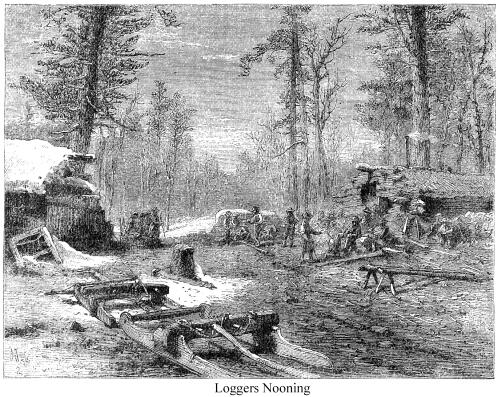 After a half hour or so the cook,
a tall, dark-haired, rather intelligent-looking Frenchman, announced
that our supper was ready. We took our seats on a rude bench,
and at a table which never came from a cabinet shop and never
saw a table-cloth, but which had on it now a dish of smoking-hot
beans, two tin basins of warm tea, some excellent raised biscuits,
etc. There was no milk for the tea, and no butter for the biscuits,
but the long, cold ride had sharpened our appetites so much that
extras were not needed to give what was before us the desired
relish. As we drank our tea and ate heartily of the pork and beans
my friend described to me the process of cooking the latter. Pointing
to a spot at the end of the log-fire and near us, he showed me
a huge iron pot filled with beans and covered tightly, and which
is buried every night in the hot ashes, where the cooking operation
goes on, and during the hours in which the consumers of these
staple edibles are snoring off the effects of yesterday's meals.
Good judges say that this manner of preparing beans for the table
is much superior to any other. I am ready to testify to the excellent
quality of those I ate—a little too rich they were for my
dyspeptic stomach—at least they were, somewhat too highly
seasoned with pork fat. But a lumberman's stomach can digest three
meals a day of them, fat and all, and without fear of the nightmare.
Nothing can swing an axe, or move a saw, or roll logs, like baked
beans. No logger who has free access to that iron pot in the ashes
complains of exhaustion. A Connecticut preacher, in the olden
times, tried to compute the number of bushels of baked beans he
had preached to on Sunday during a ministry of forty years. I
wonder how many bushels are carried into the pineries every winter! After a half hour or so the cook,
a tall, dark-haired, rather intelligent-looking Frenchman, announced
that our supper was ready. We took our seats on a rude bench,
and at a table which never came from a cabinet shop and never
saw a table-cloth, but which had on it now a dish of smoking-hot
beans, two tin basins of warm tea, some excellent raised biscuits,
etc. There was no milk for the tea, and no butter for the biscuits,
but the long, cold ride had sharpened our appetites so much that
extras were not needed to give what was before us the desired
relish. As we drank our tea and ate heartily of the pork and beans
my friend described to me the process of cooking the latter. Pointing
to a spot at the end of the log-fire and near us, he showed me
a huge iron pot filled with beans and covered tightly, and which
is buried every night in the hot ashes, where the cooking operation
goes on, and during the hours in which the consumers of these
staple edibles are snoring off the effects of yesterday's meals.
Good judges say that this manner of preparing beans for the table
is much superior to any other. I am ready to testify to the excellent
quality of those I ate—a little too rich they were for my
dyspeptic stomach—at least they were, somewhat too highly
seasoned with pork fat. But a lumberman's stomach can digest three
meals a day of them, fat and all, and without fear of the nightmare.
Nothing can swing an axe, or move a saw, or roll logs, like baked
beans. No logger who has free access to that iron pot in the ashes
complains of exhaustion. A Connecticut preacher, in the olden
times, tried to compute the number of bushels of baked beans he
had preached to on Sunday during a ministry of forty years. I
wonder how many bushels are carried into the pineries every winter!
Our repast being ended, we began to think of retiring; but
where shall we sleep? we asked ourselves dubiously. There were
two beds only, and these were full. The problem was solved when
our cook had laid down a buffalo-robe on the uneven floor and
asked us to stretch ourselves there. With another buffalo-robe
for our covering, and with our shawls folded for pillows, the
prospect for a good night's rest was quite encouraging. My friend
took the side next the fire, where his danger of being; burned
was about equal to mine of being frozen; but neither of us suffered
much. If I dreamed of any thing, it must have been of stockings,
socks, and moccasins, as not less than a hundred pairs of these
pedal coverings were hanging against the roof, partially over
the fire, and exactly in range of my eyes as I had fixed myself
for sleep; and being a little nervous from my long ride and late
supper, I was obliged to lie awake an hour or more and study this
singular sight. Calling my friend's attention to the 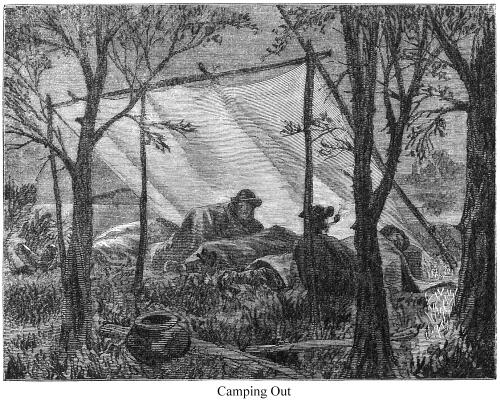 matter,
I asked if we were not in a stocking-factory or a moccasin-store
instead of a lumberman's forest-house. He replied that "the
loggers are obliged to take good care of their feet; that one
of them often wears three or four pairs of socks, with a pair
of moccasins over them; that the moccasins, because they give
the feet more freedom, rendering them less liable to freeze, are
generally preferred to coarse leather boots. Those you see hanging
there will disappear in the morning, because they will all be
pulled on to their owners' feet and walked off into the woods.
To-morrow night they will be hung up in the same places to dry
again; although, as the snow in this northern latitude is generally
very dry, they seldom get wet much," I listened to my friend's
explanation with deep interest, suggesting to myself that if all
persons would take as much pains to protect their feet against
cold and wet, consumption would be cheated of a majority of its
victims. matter,
I asked if we were not in a stocking-factory or a moccasin-store
instead of a lumberman's forest-house. He replied that "the
loggers are obliged to take good care of their feet; that one
of them often wears three or four pairs of socks, with a pair
of moccasins over them; that the moccasins, because they give
the feet more freedom, rendering them less liable to freeze, are
generally preferred to coarse leather boots. Those you see hanging
there will disappear in the morning, because they will all be
pulled on to their owners' feet and walked off into the woods.
To-morrow night they will be hung up in the same places to dry
again; although, as the snow in this northern latitude is generally
very dry, they seldom get wet much," I listened to my friend's
explanation with deep interest, suggesting to myself that if all
persons would take as much pains to protect their feet against
cold and wet, consumption would be cheated of a majority of its
victims.
A feeling of drowsiness seized me at last, and as the camp
was still, save the occasional snoring of the loggers and the
falling of a firebrand now and then, the hundred pairs of stockings
faded slowly from my vision, and I dropped off into a sleep, wondering
at the latest point of consciousness if St. Nicholas ever visits
a lumberman's camp, and if so, if he feels himself bound to stuff
every woolen leg he finds there with Christmas gifts!
We rose in the morning soon after daylight. The workmen had
already cleared the line over the fire of its burden of stockings,
and were walking about the camp with muffled feet, preparing for
breakfast. The fire, which had been allowed to smoulder and go
partially out during the night, had received a fresh supply of
logs, and brought the room into such a comfortable degree of warmth
we could hardly believe the statement made by one of the men that
the thermometer, hanging against the log-barn, showed the mercury
to be twenty-four degrees below zero. The cook disentombed the
iron pot, dished out a quantity of beans, and putting them on
the table, with a few other eatables, announced that breakfast
was ready. The men ate rapidly, and with an appetite that is enjoyed
by those only who gain their bread by the sweat of the face. Very
little was said during the meal, and each one, as soon as he had
finished, rose and departed to his day's work.
About ten o'clock our horses were harnessed, and we started
for Moses's Camp, on Tibbet's Brook, forty miles distant. The
air was quite still low down in the woods, but the soughing pine-tops
told plainly that a furious gale was raging out on the unsheltered
prairie. Notwithstanding the protection which the forest afforded,
we found it necessary to seek the still further aid of all our
extra clothing to keep out the intense cold; and whenever we came
to the bank of a stream, or some other opening where the wind
had a fair chance at us, our faces tingled with frost, and we
wept tears of ice. Our horses bounded forward as gayly as reindeers,
while the frost hung their nostrils full of stalactites, and ornamented
parts of their bodies with silver-tipped hairs.
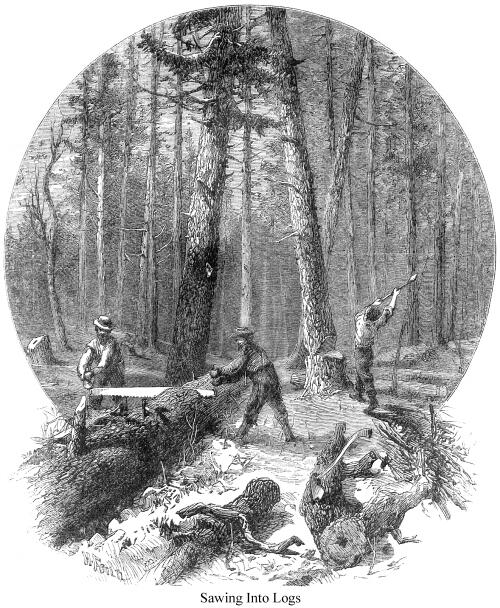 We reached Lowell's Camp, on
the "East Branch," at twelve o'clock, and Moses's Camp
a little before dark. The air of comfort and welcome which greeted
us on entering the latter forest home seemed all the more agreeable
on account of the extremely inhospitable day we had braved to
get there. We reached Lowell's Camp, on
the "East Branch," at twelve o'clock, and Moses's Camp
a little before dark. The air of comfort and welcome which greeted
us on entering the latter forest home seemed all the more agreeable
on account of the extremely inhospitable day we had braved to
get there.
The interior of this camp differed from Tidd's Camp in some
respects. It was warmed by a large stove instead of an open fire,
and thus it dispensed with that splendid ventilator, the big chimney.
Then it had the addition of a cellar; of more complete cooking
arrangements; in short, it was a more stylish, aristocratic establishment
than the first. It evidently belonged to the Fifth Avenue of the
pineries. Two clocks, one an alarm-clock, stood side by side on
a shelf; the pantry displayed a fine assortment of tin dishes;
and the Deacon's Seat was smooth and nice. Over the window, at
the east end of the camp, and on the kitchen walls, was a large
advertisement, telling the woods people that Beecher and Spurgeon
are the "two greatest preachers in the world," and that
"their sermons are published every week in the Examiner
and Chronicle!" Who can doubt the peerless ability of
these pulpit orators, or the wonderful enterprise of their publishers,
after seeing such an advertisement posted on the walls of a forester's
cabin in the far off Minnesota Pineries ?
The cook at this camp I soon discovered was to the "manner
born." He moved about in his white apron with an educated
air, and seemed as cleanly and genteel and affable as though he
had just been transferred from the Astor House. He had nothing
but tin dishes to set off his table with, but these were kept
bright and clean; and the food, well cooked, was brought on with
as much precision and style as his humble cuisine would
allow. His biscuits were light and palatable; his gingerbread
was excellent; his tea was delicious. Besides these he gave the
men nice boiled beef, the everlasting dish of beans (though these
were not baked in the ground), and stewed cranberries. He gave
them butter and milk also—the latter luxury they owed to
a good cow kept in one of the log-stables, and which was driven
into the woods at the beginning of winter.
Thirty fine-looking, healthy, robust, well-behaved men sat
down at the supper-table, and who, when their appetites were sated,
broke up the evening in various ways. Some mended their clothes,
some darned their socks, some, using the sinews of the deer, obtained
of the Indians, for thread, repaired their moccasins, while others
employed their time in reading. The hours were relieved, too,
by a little entertainment in the shape of music and dancing. One
young man, who had swung the axe all day, rosined up his bow and
gave us a few lively airs on his fiddle, while two other logmen,
who had tramped in twelve inches of snow since the early morn,
engaged in a "double shuffle," or something of the kind,
on one of the planks of the floor. A pleasant-voiced son of Erin
sang two or three songs, substituting simple musical sounds where
he was unable to recall the words. Others still filled the intervals
between the music with conversation on a variety of topics, breaking
out now and then in loud, hearty laughter. One Scandinavian youth,
busily patching his pants, which had suffered by their contact
with pine-knots, interested several listeners with some neighborhood
gossip he had treasured up with singular minuteness, concerning
a hidden pot of gold, and a ghost which kept watch over it, frightening
those who came to dig for the treasure.
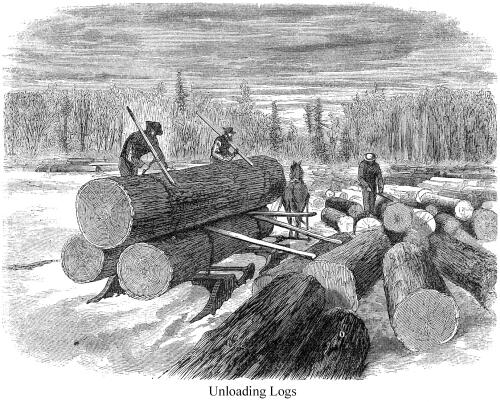 Of course a camp full of woodmen
could hardly be expected to pass a whole evening on the "Deacon's
Seat," around the big stove, without more or less indulgence
in tobacco. A large number puffed away at their meerschaums, or
their short, black, clay pipes, looking a kind of quiet content,
and as if the weariness they brought in from their day's work
were really taking flight in clouds of smoke. No stimulants stronger
than tobacco and tea were allowed in the pineries; the woods had
not yet received enough of the influence of civilization to admit
a bar within their hallowed shades. Of course a camp full of woodmen
could hardly be expected to pass a whole evening on the "Deacon's
Seat," around the big stove, without more or less indulgence
in tobacco. A large number puffed away at their meerschaums, or
their short, black, clay pipes, looking a kind of quiet content,
and as if the weariness they brought in from their day's work
were really taking flight in clouds of smoke. No stimulants stronger
than tobacco and tea were allowed in the pineries; the woods had
not yet received enough of the influence of civilization to admit
a bar within their hallowed shades.
At ten o'clock the signal for retiring was given. A half hour
later and most of the logmen were snoring—perhaps dreaming
of friends "down the river." At half past five in the
morning the alarm-clock put an end to snoring and dreaming, and
called the men from their beds again.
As soon as breakfast was dispatched the workmen divided themselves
into separate squads, according to their respective charges, and
went to their labors: one squad to drive the teams; another, the
"choppers," to fell the trees; another, the "swampers,"
to prepare the roads; another, the "sawyers," to saw
the trees into logs. Notwithstanding the mercury was still at
a frightful distance below zero my friend and I followed on—he
to see how his men had got along, how many logs bad been hauled,
etc.; I to obtain a little information concerning the logging
business. We had gone but a few rods when we made the discovery,
by some tracks in the snow, that a couple of wolves had been prowling
about our camp during the night. Why they did not come nearer,
give us their usual lupine serenade, and even thrust their noses
into the door, we did not understand. This was the nearest we
came to seeing any wild beasts during our stay in the woods. We
hoped to meet some deer, as their tracks were plenty every where,
but we did not happen to see one. Very much to our disappointment,
we saw only one wild Indian. This one, as he stepped out of the
road to let us pass, frightened our horses terribly with the great
white blanket thrown over his head. It is said that horses dislike
the peculiar scent that Indians carry about their persons and
clothes.
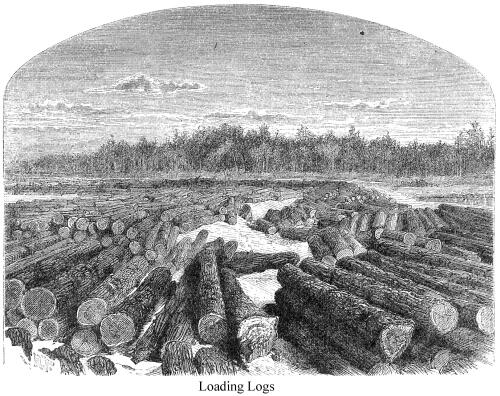 Within a quarter of a mile of
the camp we came where the pines stood thick and tall, and handsome
enough to delight any lumberman's eyes. Hundreds of splendid symmetrical
trunks might have been counted without changing our position;
and one could almost fancy, as he looked out among them, that
they were the columns of some old and endless temple, their dark
and shaggy tops forming the lofty roof, and the snow beneath the
white marble floor. Often three or four trees of about equal size
were seen standing close together in a cluster, as though they
sprang from kindred germs, and had cherished a common sympathy
through their hundred years of growth; generally, however, those
large enough for use were half a dozen yards apart—sometimes
as many rods. Scattered between them were a few oaks, iron-wood,
and birch—the latter ornamented with the usual fringes and
curls. All the timber here, except the pine, is valueless. Although
wood is worth, when cut, from $6 to $10 a cord in Minneapolis
and St. Paul, it is not worth ten cents a cord on Tibbet's Brook,
because there is no means for transporting it to places where
it is wanted. Even the land itself will, in many cases, be abandoned
to the tax claims as soon as it is cleared of pine. Within a quarter of a mile of
the camp we came where the pines stood thick and tall, and handsome
enough to delight any lumberman's eyes. Hundreds of splendid symmetrical
trunks might have been counted without changing our position;
and one could almost fancy, as he looked out among them, that
they were the columns of some old and endless temple, their dark
and shaggy tops forming the lofty roof, and the snow beneath the
white marble floor. Often three or four trees of about equal size
were seen standing close together in a cluster, as though they
sprang from kindred germs, and had cherished a common sympathy
through their hundred years of growth; generally, however, those
large enough for use were half a dozen yards apart—sometimes
as many rods. Scattered between them were a few oaks, iron-wood,
and birch—the latter ornamented with the usual fringes and
curls. All the timber here, except the pine, is valueless. Although
wood is worth, when cut, from $6 to $10 a cord in Minneapolis
and St. Paul, it is not worth ten cents a cord on Tibbet's Brook,
because there is no means for transporting it to places where
it is wanted. Even the land itself will, in many cases, be abandoned
to the tax claims as soon as it is cleared of pine.
Notwithstanding the general excellence of the pines which stretched
away in grand perspective on every side, there were many, of course,
unfit for use. Some were short and scraggy; some were "shaky;"
and some were old and rotten. Marsh, in his article on the "Quality
of Timber," says: "The white pine, Pinus Strobus, for
instance, and other trees of similar character and uses, require
for their perfect growth a density of forest vegetation around
them, which protects them from too much agitation by the winds,
and from the persistence of the lateral branches, which fill the
wood with knots. A pine which has grown under these conditions
possesses a tall, straight stem, admirably fitted for masts and
spars; and at the same time its wood is almost wholly free from
knots, is regular in its annular structure, soft and uniform in
texture, and consequently superior to almost all other timber
for joinery. If, while a large pine is spared, the broad-leaved
or other smaller trees around it are felled, the swaying of the
tree from the action of the wind mechanically produces separation
between the layers of annual growth, and greatly diminishes the
value of the timber. The same defect is often observed in pines
which, from accident of growth, have over-topped their fellows
in the virgin forest. The white pine growing in the fields or
open glades in the woods is totally different from the true forest
tree, both in general aspect and quality of wood. Its stem is
much shorter, its top is less tapering, its foliage is denser
and more inclined to gather into tufts, its branches more numerous
and of larger diameter, its wood shows much more distinctly the
divisions of annular growth, is of coarser grain, harder, and
more difficult to work into mitre joints. Intermixed with the
most valuable pines in the American forests are many trees of
the character I have just described. The lumbermen call them 'saplings,'
and generally regard them as different in species from the true
white pine, but botanists are unable to establish a distinction
between them, and as they agree in almost all respects with trees
grown in the open grounds from white pine seedlings, I believe
their peculiar character is due to unfavorable circumstances in
their early growth. The pine, then, is an exception to the general
rule as to the inferiority of the forest to the open-ground tree."
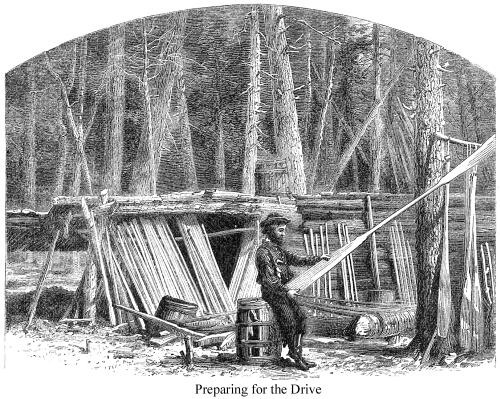 The truth of much, if not all,
of this quotation was verified wherever we made an observation.
The tallest, straightest, finest pines we saw, those freest from
limbs and knots, among which the logmen seemed to revel like a
herd of oxen just let loose in a full-grown field of Illinois
corn, were found in the densest portions of the woods, where the
shade was so great and the atmosphere so dank that a ray of sunlight
could hardly penetrate there. The low, scraggy growths, whose
unmannered trunks gave them immunity from the ruthless axe, were
generally situated in more open places, and at greater distances
from each other. The thicker the neighborhood the statelier and
loftier grew each individual tree, as though it took a kind of
pride in outdoing its fellows. Sometimes a tree which had a fair
outside, like the hypocrite among men, was shaky and hollow within;
and as we have certain methods of testing the virtue of human
pretensions, so the chopper had a way of sounding his tree, determining
its internal condition often by the first stroke of the axe; besides,
he could detect the lumber qualities of a tree by his experienced
eye, to which patches of lichens and certain colored fungi attached
to the bark as surely revealed a concealed rottenness as the scarlet
excrescences on a drunkard's nose divulge the fact of an unsound
life. The truth of much, if not all,
of this quotation was verified wherever we made an observation.
The tallest, straightest, finest pines we saw, those freest from
limbs and knots, among which the logmen seemed to revel like a
herd of oxen just let loose in a full-grown field of Illinois
corn, were found in the densest portions of the woods, where the
shade was so great and the atmosphere so dank that a ray of sunlight
could hardly penetrate there. The low, scraggy growths, whose
unmannered trunks gave them immunity from the ruthless axe, were
generally situated in more open places, and at greater distances
from each other. The thicker the neighborhood the statelier and
loftier grew each individual tree, as though it took a kind of
pride in outdoing its fellows. Sometimes a tree which had a fair
outside, like the hypocrite among men, was shaky and hollow within;
and as we have certain methods of testing the virtue of human
pretensions, so the chopper had a way of sounding his tree, determining
its internal condition often by the first stroke of the axe; besides,
he could detect the lumber qualities of a tree by his experienced
eye, to which patches of lichens and certain colored fungi attached
to the bark as surely revealed a concealed rottenness as the scarlet
excrescences on a drunkard's nose divulge the fact of an unsound
life.
Following close upon the "choppers," who did nothing
but fell the trees and trim them, came the "sawyers."
Two men standing on opposite sides of a prostrate tree, a few
feet apart, and facing each other, one with his right and the
other with his left foot advanced grasp the upright handles of
a cross-cut saw, and drawing it backward and forward with an easy,
regular motion, expelling the saw-dust, whose piny odor is pleasant
to a lumberman's nostrils, into a heap on either side of the tree,
they sever the trunk into logs of various lengths. Next came the
"swampers," who prepared the roads for the teams which
were waiting to draw the logs away to the landing.
I watched the "loading" process with a deep interest,
as I saw here how intellect, as every where else, has triumphed
over mere brute force. The time was, and not many years ago, when
logmen had little to aid them in getting their logs on to a sled
besides their own hands. There was then no alternative but the
hardest kind of lugging and lifting; but all that has changed.
Using a log-chain, which is attached to the middle of the log
in such a way as to get a purchase on the latter, and cause it
to roll when 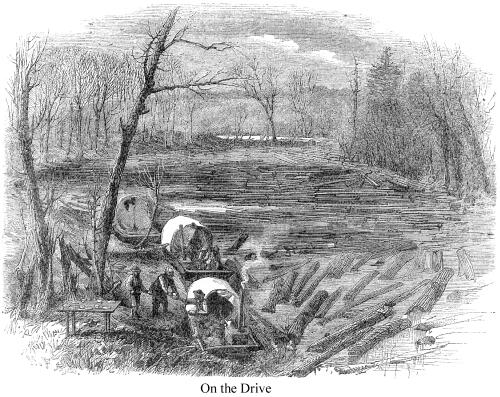 the chain is pulled,
the logman now makes the oxen do the lifting, while he superintends
the operation and applies a little brain work. Six large logs
were piled on to one sled in a few moments of time, two or three
men assisting with their "cant-dogs," the whole costing
as little manual effort as the laying together of an equal number
of common fence-rails. The sleds used were at least one-third
wider than common sleds, and hence they made a very wide path.
Along this "broad gauge" we followed the teams to see
where the logs were deposited. After a few minutes' walk we emerged
from the thick timber into an opening through which ran Tibbet's
Brook. Here was what was called the "landing." Standing
on the banks of that winter-bound brook we could see thousands
of logs which had been cut and hauled from the surrounding forests.
Counted in feet the logs we saw at a single view numbered between
four and five millions! It was a splendid sight. My friend, who
owned them all, and as many more besides, whose mill at Minneapolis,
a hundred miles below, was ready to convert these logs into sawed
lumber, worth on an average twenty dollars per thousand feet,
must have enjoyed the spectacle even more than I. the chain is pulled,
the logman now makes the oxen do the lifting, while he superintends
the operation and applies a little brain work. Six large logs
were piled on to one sled in a few moments of time, two or three
men assisting with their "cant-dogs," the whole costing
as little manual effort as the laying together of an equal number
of common fence-rails. The sleds used were at least one-third
wider than common sleds, and hence they made a very wide path.
Along this "broad gauge" we followed the teams to see
where the logs were deposited. After a few minutes' walk we emerged
from the thick timber into an opening through which ran Tibbet's
Brook. Here was what was called the "landing." Standing
on the banks of that winter-bound brook we could see thousands
of logs which had been cut and hauled from the surrounding forests.
Counted in feet the logs we saw at a single view numbered between
four and five millions! It was a splendid sight. My friend, who
owned them all, and as many more besides, whose mill at Minneapolis,
a hundred miles below, was ready to convert these logs into sawed
lumber, worth on an average twenty dollars per thousand feet,
must have enjoyed the spectacle even more than I.
In order for the reader to gain any adequate idea of the lumber
interests carried on in these woods it should be observed that
there were a great many other landings scattered about in different
sections and on various streams, perhaps fifty in all, similar
to the one I have mentioned—some smaller and some larger.
Nearly or quite an equal number might have been found on the Upper
Mississippi itself above St. Cloud. In both pineries, the Upper
Mississippi and Rum River, from eight hundred to a thousand men
were employed, and not far from one hundred millions of feet of
logs were secured during the winter.
The streams spoken of, on which "landings" are made,
are numerous, and traverse an extensive tract of country, intersecting
everywhere rich pine regions, and serving as outlets to the thousands
of logs that are rolled over their banks. Although many of these
streams, at certain seasons of the year, are so shallow and muddy
that an Indian can not navigate them in his birch canoe, yea,
that a common teal duck can not find enough depth of water to
swim there, yet when swollen by the spring thaws each one bears
away on its bosom great argosies of wealth, and becomes in the
lumbermen's eyes a modern Pactolus. In some instances the pines
grow very near the streams, and the trouble of hauling the logs
is slight; but often they are brought three or four miles. The
hauling distance, for obvious reasons, will increase from year
to year.
The process of moving the logs from their winter "landings"
down the streams to Minneapolis and St. Anthony is called the
"drive." The operation begins as soon as the snows are
melted and the streams, augmented by the spring freshets, are
high enough to float the logs. In those instances where the stream
is too shallow and feeble to lift the logs, even with the help
referred to, a dam is built across it, and from the waters thus
temporarily deepened the logs are pushed forward a considerable
distance to a point where they must wait, it may be, for the erection
of another dam. By repeating this slow, tedious, and expensive
work the logs are moved along into the river, where they float
with less trouble. Some of the brooks are deep enough at the start
without any dam. It is a magnificent sight to see the thousands
of logs as they come down out of the forest, swimming along singly
or in large masses, into the main body of Ram River at Princeton.
The surface of the river below this point is sometimes entirely
covered for a distance of twenty-five miles.
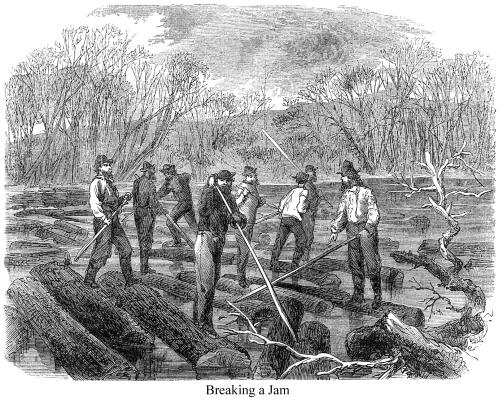 The men employed on the "drive,"
and who, for the most part, are men who spent the winter in the
woods, and who consent to engage in this business at considerably
increased wages, divide themselves into separate squads, and proceeding
along the river, urge the logs forward as rapidly as possible. The men employed on the "drive,"
and who, for the most part, are men who spent the winter in the
woods, and who consent to engage in this business at considerably
increased wages, divide themselves into separate squads, and proceeding
along the river, urge the logs forward as rapidly as possible.
Behind the whole line of operations, or behind each regiment
of logs, follows the "waugan"—a small boat or barge
with a canvas awning stretched over it, and carrying the cook,
cooking-utensils, and supplies for the men. At the meal-hour,
which occurs four times a day, the "waugan" hauls up
to the bank, fastens her bow to a tree, when the cook spreads
his table on the shore and blows his horn—the echoes of which,
as they sound along the winding stream, call the weary men to
their ample repast of hot tea and baked beans. At each sunset
the captain of the "waugan," having moored his craft
to the shore again, selects a proper spot and erects a tent, under
which the men spend the night. A big, hot fire in front of the
tent keeps off the night chill.
The men by long practice on the "drive" become very
expert in their business. They balance themselves on floating
logs and leap from one to another of these precarious footings
with the agility and skill of circus-riders, while green hands
would be sure of a ducking every few minutes, if they did not
meet with the worse fate of breaking their necks. If a log lodges
on a rock in the middle of the stream, the nearest man plunges
into the water, often waist-deep, and wading out to it catches
hold of the refractory member with his "cant-dog"—a
short hand-spike with an adjustable iron hook attached to the
end—and hurls it quickly into the channel again, when it
darts forward after its fellows. If the water is too deep for
wading, an experienced oarsman puts off toward the points of obstruction
in a "batteau"—a long, slim, red boat, which shoots
over the waves with the ease and swiftness of an Indian's arrow.
This boat is handled by a single oar, is not easily upset, will
stand any amount of jamming against stones, can swim in the shallowest
places, and ride safely down the most dangerous rapids. Sometimes
several men may be seen in it, standing, and pushing it about
with long poles. Whether it is moored under the banks, or left
to float at will on some circumfluous wave along the margin of
the river, or making its diagonal trips from shore to shore, or
running in and out of the spaces between the floating logs, the
"batteau" forms one of the most novel, picturesque,
and stirring things which one will encounter in a "drive."
Often, while making a turn in the river, the immense mass of
logs crowd so close upon each other that they fill the whole space
between the shores, and form a vast wedge, or, in the vernacular
of lumbermen, a "jam," and which, until it is broken,
prevents any further progress of the logs; as soon, therefore,
as this "jam" happens a score of men, with their "cant-dogs"
in hand, rush on to the obstructed logs, and loosening a few of
the front ones, put the whole in motion once more.
Another frequent and laborious part of the "drive"
is "sacking." This takes place when the logs, by means
of a rapid current at a bend in the river, or from some other
cause, have been thrown up and lodged upon the shore. To get them
back again into the river, three or four, often half a dozen,
men seize each log with their "cant-dogs," and absolutely
lift it or drag it along the mud and sand a considerable distance.
And thus, by "sacking," breaking "jams,"
wading and dislodging stragglers, pushing the shore logs toward
the middle of the current, rowing here and there in the batteau,
and tumbling such pines as had perched themselves high and dry
on some projecting bank or stone—by all these processes,
repeated day by day, the whole "drive" is advanced until;
after a few weeks, it reaches the "booms" prepared for
it at the mouth of the Rum River and at other points on the Mississippi
near the 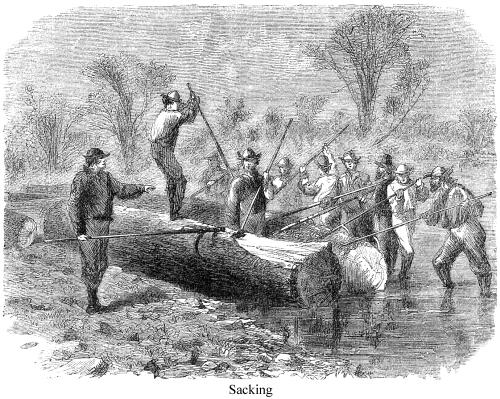 Minneapolis and St. Anthony mills.
Passing down Tibbet's Brook a short distance we came to Moses's
lower "landing," which differed from the other in no
important particular except that it contained a few logs of enormous
size. On the butt end of the largest one we counted two hundred
and fifty annular rings! Thus the tree from which it was
taken was born about the year that William Shakspeare died and
Oliver Cromwell matriculated at Sussex College. It was four or
five years old when the Pilgrims landed at Plymouth Rock; and
was a flourishing youth of fifty when John Milton went quietly
to sleep in his house at Bunhill Fields; it had stretched its
green top up to a magnificent height, and was able to boast of
an experience of nearly one hundred and fifty years when the famous
and infamous "Stamp Act" was passed, and before Ohio,
Indiana, Illinois, and Michigan claimed even a territorial government;
its two-hundredth birthday had passed before a single white man
had come to admire its giant trunk, and before its " topmost
branches," peering over the shoulders of younger pines, could
see beyond the "Land of the Dakotas." How cruel that
a civilization so long waited for should signal its approach by
ordering her first hardy skirmishers to cut this patriarch of
the forest down, and to bring in its dismembered parts as a trophy
of the ever-widening circle of her conquests! Two centuries and
a half of patient growing to be torn asunder in a moment by irreverent
saws, and to serve the cupidity of a race that turns all the natural
waterfalls into milldams, and the forests into lumber-yards! Minneapolis and St. Anthony mills.
Passing down Tibbet's Brook a short distance we came to Moses's
lower "landing," which differed from the other in no
important particular except that it contained a few logs of enormous
size. On the butt end of the largest one we counted two hundred
and fifty annular rings! Thus the tree from which it was
taken was born about the year that William Shakspeare died and
Oliver Cromwell matriculated at Sussex College. It was four or
five years old when the Pilgrims landed at Plymouth Rock; and
was a flourishing youth of fifty when John Milton went quietly
to sleep in his house at Bunhill Fields; it had stretched its
green top up to a magnificent height, and was able to boast of
an experience of nearly one hundred and fifty years when the famous
and infamous "Stamp Act" was passed, and before Ohio,
Indiana, Illinois, and Michigan claimed even a territorial government;
its two-hundredth birthday had passed before a single white man
had come to admire its giant trunk, and before its " topmost
branches," peering over the shoulders of younger pines, could
see beyond the "Land of the Dakotas." How cruel that
a civilization so long waited for should signal its approach by
ordering her first hardy skirmishers to cut this patriarch of
the forest down, and to bring in its dismembered parts as a trophy
of the ever-widening circle of her conquests! Two centuries and
a half of patient growing to be torn asunder in a moment by irreverent
saws, and to serve the cupidity of a race that turns all the natural
waterfalls into milldams, and the forests into lumber-yards!
To what degree of longevity this tree might have attained if
it had been left to its natural course is uncertain, but we could
discover no signs of decay, internal or external. Dr. Williams,
who is quoted by Mr. Marsh, says he found "pines four hundred
years old," and that a friend of his discovered soiree "much
older." So it is probable that our tree might have survived
another term of two hundred years. In that case what other changes
would it have witnessed in this country before its branches rotted
and its heart became worm-eaten and dead?
At twelve o'clock all the men returned to the camp for "nooning."
The horses and oxen were unloosed from the sleds, driven into
the log-barn, and fed with hay and oats, while the workmen sat
down with huge appetites to their savory dishes of beans. My friend
and I, dreading to encounter the stinging air again, spent the
afternoon on the Deacon's Seat, close by the camp stove. The following
morning we bade adieu to our camp friends, who had entertained
us so generously, and started for home by way of St. Cloud. Our
road, which struck off in a westerly course, led us in a little
while across the "West Branch" of Rum River, and along
by the door of Brown's Camp. The sun shone clear in the cold March
sky, dropping a beam now and then through the dense boughs upon
the quiet snow, which was spread like a white carpet on the floor
of the woods. The air, although a little more pungent than one
might wish, was brisk and healthy, causing our frames to tingle
with inexpressible delight. A more charming, inspiring, invigorating
morning's ride than this can hardly be imagined. The road, much
of the time, wound through a majestic colonnade of pines, whose
branches formed splendid arches over our heads, and threw down
the most welcome odor. Altogether we seemed to be riding through
an enchanted forest. The scene was mightily changed, however,
the moment we emerged from the woods and began to cross the open
prairie east of St. Cloud. The wind, seeming to seek revenge for
our temporary escape from its power, swept upon us with merciless
fury, and we were obliged to cover our faces to keep them from
instant freezing.
We at last reached St. Cloud at two o'clock. After a rest of
two hours we drove to Clear Water, where we spent the night. The
next day about five o'clock p.m. we arrived in Minneapolis, having
ridden two hundred miles during the five days of our absence,
and all but thirty miles of the distance in a sleigh, the thermometer
keeping far enough below zero all the while to make it one of
the coldest weeks ever experienced by Minnesotians in the month
of March.
Logging Page
| Contents Page
|







